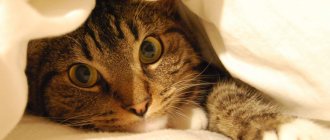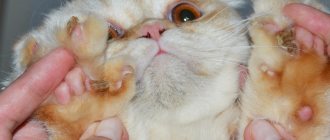Why do my ears smell bad?
Unpleasant odor from a cat's ears can be caused by the following factors:
- Suppuration that occurs against the background of traumatic injuries. Often, pets independently scratch the inside of the auditory organs when they are scratched, and fights are not excluded. When the infection gets into the ear, there is brown discharge with pus, a bad odor and a deterioration in the general condition of the cat, possibly an increase in body temperature.
- An inflammatory process caused by various liquids entering the hearing organ. Mostly, water ends up in them due to the carelessness of cat owners while bathing.
- Skull trauma. Impacts can cause bleeding and inflammation in the ears. As the blood accumulates, it becomes infected and the ear becomes inflamed. In addition to the smell of rotten meat, you can notice pus.
- Otitis. It is an inflammatory process in the ear, as a result of which animals experience discharge from the auditory organs, loss of appetite, and an unpleasant odor. It is important for the owner not to ignore these symptoms, since the pathology can cause a serious deterioration in hearing function or lead to complete deafness in the affected ear.
- Ear mite. The disease is often caused by the superficial sarcoptoid mite Otodectes cynotis. During the course of the disease, an inflammatory process occurs, which is sometimes complicated by infection, as a result of which stink is observed from the ear.
- Allergy. Mostly allergic reactions to foods are detected in cats, but medications, care products, and pollen can also act as allergens.
- Neoplasms. If your kitten's ear stinks, this symptom may be the first sign of a malignant or benign tumor developing in the auditory organs.
Prevention
Prevention of the disease consists of monthly examination of the ear canals and preventive removal of accumulated wax. According to the anatomical features of the structure of shells in Sphinxes, Siamese, and Orientals, they are treated weekly.
One of the reasons for the development of otitis media is an allergic response to food. Housewives who treat their pets with food that is unusual for cats, as well as those who abuse vitamin supplements, are to blame. An excess of biological catalysts is more harmful than hypovitaminosis. The optimal solution is to use premium professional feed.
Timely disinsection prevents the proliferation of ectoparasites, as well as ear mites. The latter are activated when the immune system is weakened, so timely vaccination will protect the cat from viral infections and arthropod parasites.
Bathing causes a lot of anxiety. The animal does not need water treatments, but cat owners think differently. To prevent liquid from getting into the ear canals, you need to insert cotton plugs before bathing, and do not forget to remove them after the procedure.
Regular ear cleaning prevents ear infections
Associated symptoms
The animal may often rub the outer part of the auditory organ with its paw.
In addition to the fact that the cat’s ears begin to stink, the owner of a pet may notice the following undesirable symptoms:
- rubbing the auditory organs with a paw;
- redness of the inside of the ear;
- loss of appetite;
- general increase in body temperature;
- apathy or irritability;
- constant meowing;
- rashes on the skin.
Signs of illness
It is not necessary to immediately take your pet to the veterinarian to determine why the ear smells of pus; this in itself is one of the signs of the disease, but there are others.
- The cat often scratches its sore ear with its paw, rubs it against furniture, the legs of its owners, and tilts its head in the direction where it feels the greatest itching.
- Under these conditions, it is worth examining the sore ear; its surface will be reddened. The examination itself is not so easy, since the animal experiences pain.
- When the inflammation process goes too far, pus flows from the cat’s ear. Externally it is gray in color.
- The behavior of the pet changes: apathy appears, there is no appetite, the cat prefers to lie down more, moves little and reacts extremely painfully to stroking, especially of the head.
The characteristic unpleasant odor from the ear completes the whole picture, which suggests that it is necessary to cure this disease without delay. But when pus flows, this is already a fairly advanced stage of the disease, so there are several types of feline otitis media, which is what the disease is called in scientific terminology.
Diagnostics
If a cat has a bad ear odor, it is important for owners to take the animal to a veterinary clinic as soon as possible. At the appointment, the veterinarian will conduct a survey of the owner, during which he will find out how long ago the bad smell appeared and whether additional symptoms are present.
The doctor then begins to examine the ears using an otoscope. Next, the sick animal is prescribed a general blood test, as well as an ear smear. If necessary, a biopsy is prescribed, during which a piece of tissue from the auditory organ is removed.
What to do to get rid of an unpleasant odor?
The first thing to do if your cat has smelly ears (of course, in the absence of obvious inflammation and severe pain in the area) is to clean the ear canal of excess secretions.
For this purpose, a large number of hygiene lotions are sold, often with the addition of light anti-inflammatory and antiseptic components. The lotion (you shouldn’t skimp, it’s better to pour in more liquid, at least half a milliliter) is dropped into the cat’s ear, after which the base of the auricle is massaged, and thus the solution is distributed throughout the entire ear canal.
After this, excess fluid along with impurities are removed from the ear canal naturally; the person only needs to wipe the inside of the auricle with a cotton swab. You can repeat the procedure several times - let the cat shake its head for a while and thus get rid of everything unnecessary.
After cleansing, you can begin instilling medicinal drops if prescribed by your doctor. Sometimes systemic treatment with tablets or injections is required, for example, for severe bacterial infections. In rare cases, for example, with neoplasms or severe narrowing of the auditory canal, surgery may be required.
And yet, most often the cause of unpleasant odor from the ears is excessive secretion of ear fat. In this case, it will be enough to periodically perform hygiene procedures to maintain the cleanliness and health of the auditory canal.
What canned food tastes best for cats?
RESEARCH ATTENTION! You and your cat can take part in it! If you live in Moscow or the Moscow region and are ready to regularly observe how and how much your cat eats, and also remember to write it all down, you will receive FREE SET OF WET FOOD.
Project for 3–4 months. Organizer - Petkorm LLC.
Want to participate? Call!
It's always so nice to play with your favorite cat! Look at its well-groomed fur, stroke your pet, but if you feel an unpleasant or even disgusting smell from the ears of cats, you probably will not have a special desire to play with the animal. What could be the reason for this phenomenon?
How is the treatment carried out?
General recommendations
Part of the treatment of the disease is cleansing the auditory organs with peroxide.
The treatment regimen is directly related to the factor that provoked the stench from the cat’s ear. When the inflammatory process is accompanied not only by a bad odor, but also by suppuration, pet owners will need to cleanse the ear organ of pus daily. To carry out the procedure, you will need to follow the following algorithm of actions:
- Get rid of fur from the inside of the ear.
- Using a cotton swab and disinfectant solutions, clean the ear from discharge. It is recommended to use hydrogen peroxide.
- Dry the ear. It is permissible to use gauze, a bandage or a napkin, carefully blotting the organ.
After these manipulations, you need to resort to the help of medications prescribed by the veterinarian. For example, if a cat is diagnosed with otitis media, medications are prescribed that have a bactericidal, anti-inflammatory, anesthetic, antimycotic effect. Ear drops "Aurikan" and "Surolan" are often used. You will need to instill medications into both ears, even in a situation where only one is affected.
The right approach to nutrition
It is important that the animal eats vegetables during illness.
During therapy, the pet owner will need to monitor its diet. It is important to include food in the menu that is well digestible and contains a sufficient number of microelements and vitamins. It is recommended to feed cats lean meats, vegetables, rice and buckwheat, chicken and quail eggs. Once a week it is permissible to pamper your cat with boiled fish and fermented milk products. As for industrial feeds that are sold in stores, veterinarians from the Zoovet clinic recommend abandoning them during therapy. Such precautions are due to the fact that allergens may be present in their composition.
It is permissible to return to ready-made food only after the source of allergic reactions in the cat has been accurately identified.
What should you keep in mind?
It must be remembered that otitis is always caused by something, so until you rule out the cause (mite, splinter, tumor), treatment will have a temporary, short-lived effect.
Ear mites and tumors are also often confused. The thing is that neoplasms almost always affect one ear, and mites affect both at once. This is especially true for adult cats, in whom the risk of developing a tumor process in the ear canal is very high.
Sources:
https://dolphin-school.ru/techet-uho-u-kota/ https://koshkamurka.ru/5944-chto-delat-esli-techet-iz-uha-u-koshki.html https://veterinariya .com/vyideleniya-iz-ushey-u-koshki.html
Preventive actions
To prevent an unpleasant aroma from a cat’s ears, it is important for the pet owner to systematically examine his hearing organs. At least once a week you will need to clean your ears using special liquids and cotton swabs. The cat's owner also needs to ensure that she does not spend time in drafts. When bathing, it is recommended to insert cotton balls into your pet's ear to prevent water from getting into them.
After the bath, the animal should be in a warm room. If necessary, the cat can be carefully dried with a hairdryer. An important preventive measure is diet control. If the owner prefers to give the cat ready-made industrial food, it is imperative to take into account its composition and expiration date. When choosing complementary foods, you need to pay attention to the gender, age and health status of your pet.
Pictures and videos
Figure 1. “Anatomical structure of a cat’s ear”
Figure 2. “Erythema and furring in allergic otitis media”
Video 1. “Treatment of otitis in cats and dogs”











